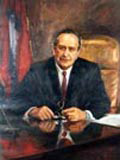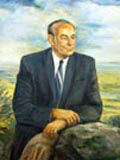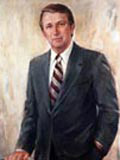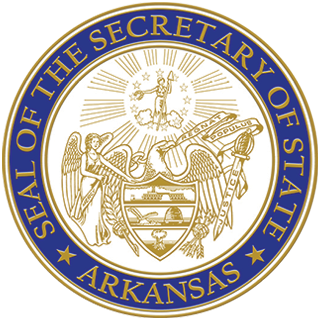State Governors 1953-1975
State Governors 1953-1975
 Francis Adams Cherry
Francis Adams Cherry
Born: September 5, 1908, at Fort Worth, Texas
Died: July 15, 1965, at Jonesboro, Arkansas
Buried: Oaklawn Cemetery, Jonesboro
Served: 1953-1955
Arkansas's 35th governor was born in Fort Worth, Texas, moved with his family to Enid, Oklahoma, attended Oklahoma A& M College, and graduated from the University of Arkansas in 1936, earning a law degree. Cherry was appointed U.S. Commissioner for the Jonesboro division of the Eastern district in 1939, and next was named referee for the workmen's compensation commission. Cherry entered politics in 1942, when he was elected chancellor and probate judge of the 12th Chancery District. During World War II, Cherry waived his judicial immunity and applied for a naval commission. After serving two years in the navy, he resumed his duties as chancellor in 1946 and was re-elected to the position in 1948. Cherry was elected Governor of Arkansas on November 4, 1952 after a campaign in which he effectively used the medium of radio to raise both his visibility and campaign funds. During his tenure, a new department of finance and administration was formed and reforms were made in the highway commission. Cherry advocated industrial development, and sent representatives to other states to promote the use of Arkansas' raw materials. He ran unsuccessfully for a second term. After leaving office in 1955, Cherry was appointed to the federal Subversive Activities Control Board and was named its chairman in 1963. Governor Cherry died in July 1965 after two years of declining health.
Orval Eugene Faubus
 Born: January 7, 1910, near Combs, Arkansas
Born: January 7, 1910, near Combs, Arkansas
Died: December 14, 1994, at Conway, Arkansas
Buried: Orval E. Faubus Memorial Gardens, Combs
Served: 1955-1967
Orval Faubus was born in 1910. Literally raised in a log cabin and educated in one-and-two-room schools, Faubus attended Commonwealth College at Mena and worked as an itinerant farmer, lumberjack and schoolteacher before enlisting in the U.S. Army from 1942 to 1946. After the war, Faubus served on the Arkansas State Highway Commission and as director of highways from 1952 to 1953. He was postmaster at Huntsville from 1946 to 1947 and from 1953 to 1954. Elected to the governorship in 1954 after a runoff, Governor Faubus initially pursued a moderately progressive course in office but in 1956, to combat his political opponents who were staunch segregationists, he adopted a hard-line segregationist stance. In 1957, Governor Faubus gained national attention when he called out the Arkansas National Guard to prevent the integration of Central High School in Little Rock, but he was eventually forced to withdraw the Guard. After threats of rioting, President Dwight D. Eisenhower sent U.S. troops to Little Rock and put the National Guard under federal command to ensure the integration of the school. Faubus's political expediency resulted in his repeated re-election as governor but also prevented him from moving into the national political arena. During his six, two-year terms, he served on the National Governors' Conference Executive Committee from 1957 to 1958 and chaired the Southern Governors' Conference from 1962 to 1963). In 1970, 1974, and 1986 he sought re-election as governor of Arkansas but was unsuccessful in each attempt at a political comeback, the last time losing to Bill Clinton.
Winthrop Rockefeller
 Born: May 1, 1912, at New York City, New York
Born: May 1, 1912, at New York City, New York
Died: February 22, 1973, at Palm Springs, California
Buried: Winrock Farm, Petit Jean Mountain
Served: 1967-1971
"The Arkansas Rockefeller" attended Yale University from 1931 to 1934. In 1941 he enlisted in the U.S. Army as a private soldier, later earning his officer's commission. He served in the Pacific Theater during World War II, earning the Bronze Star with Oak Leaf Cluster and the Purple Heart. After the war, Rockefeller involved himself in his family's businesses and various philanthropies before moving to Arkansas in 1953. Rockefeller established himself on over 900 acres atop Petit Jean Mountain near Morrilton where his Winrock Farms operation concentrated on purebred Santa Gertrudis cattle, feed grains, rice and hay. In 1955 he became the first chairman of the Arkansas Industrial Development Commission. During his nine-year leadership of the commission, Arkansas led all states in attracting new industry. Rockefeller's frustration with Arkansas's effective one-party system led him into politics; his popularity, which crossed party lines, made him the first viable Republican gubernatorial hopeful since Reconstruction. In 1964, Rockefeller ran for governor, only to lose to Orval Faubus. He ran again in 1966, this time successfully, and won a second term in 1968. As governor, Rockefeller was an advocate for human rights, government reform, cultural development, and education. His attempts to reform Arkansas's notorious prison system met with much criticism, but at his direction much of Hot Springs's illegal gambling was halted, and a number of measures including a general minimum-wage law, a freedom-of-information act and banking reforms were enacted. Rockefeller's instinctive racial progressivism led to the appointment of increased numbers of African-Americans to boards and commissions, plus increased minority hiring in state jobs. Rockefeller failed in his attempt to win a third term in 1970 but continued to be active in Republican Party matters and public affairs until his death in 1973.
Dale Leon Bumpers
 Born: August 12, 1925, at Charleston, Arkansas
Born: August 12, 1925, at Charleston, Arkansas
Died: n/a
Buried: n/a
Served: 1971-1975
Dale Bumpers briefly attended the University of Arkansas before enlisting in the U.S. Marines during World War II. After the war Bumpers finished his education at the University of Arkansas and Northwestern University Law School. Early in his career he practiced as a small-town attorney, owned and operated a hardware store, raised cattle, and became active in community affairs. He entered politics via service on the Franklin County and Charleston school boards, later serving as Charleston City Attorney and in 1968 Special Justice of Arkansas Supreme Court. He ran for Governor in 1970, one of seven Democratic primary candidates including former governor Faubus and Attorney-General Joe Purcell. Finishing second to Faubus in the primary, Bumpers bested the long-serving governor in the runoff primary and went on to handily defeat Winthrop Rockefeller in the general election. Bumpers repeated his success in 1972. During his first term, Dale Bumpers successfully guided a government-reorganization program through the legislature, won a revision of the state income-tax, increased teacher salaries, oversaw the creation of a consumer-fraud division in the Attorney-General's office, and saw the legislature approve an expansion of the state parks system. Second-term victories included increased aid to education, construction programs for the state's colleges and elimination of the trustee system in the state prison system. In 1974, Bumpers ran for and won the U.S. Senate seat held by J. William Fulbright, beginning over two decades' service in that body.




